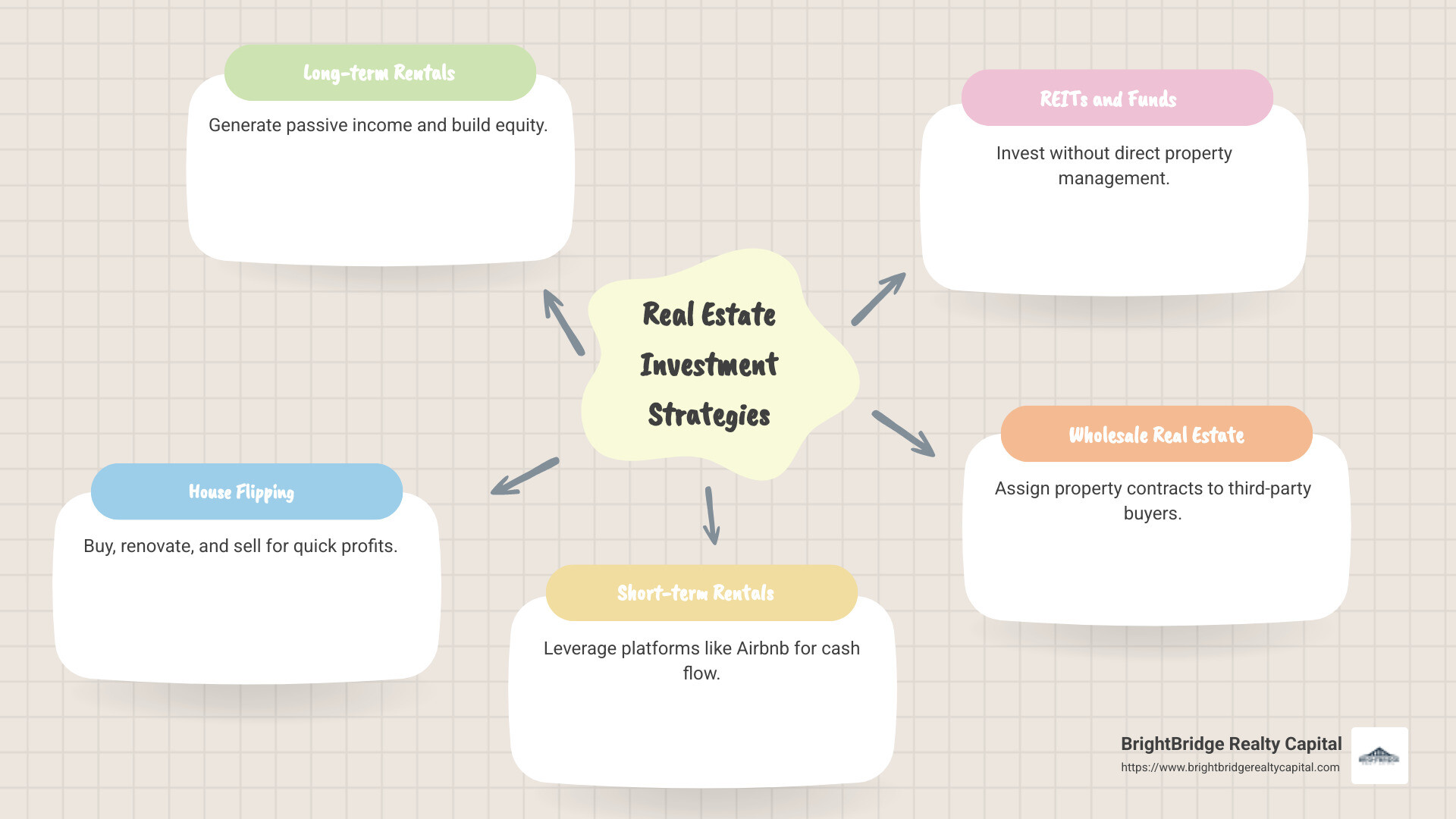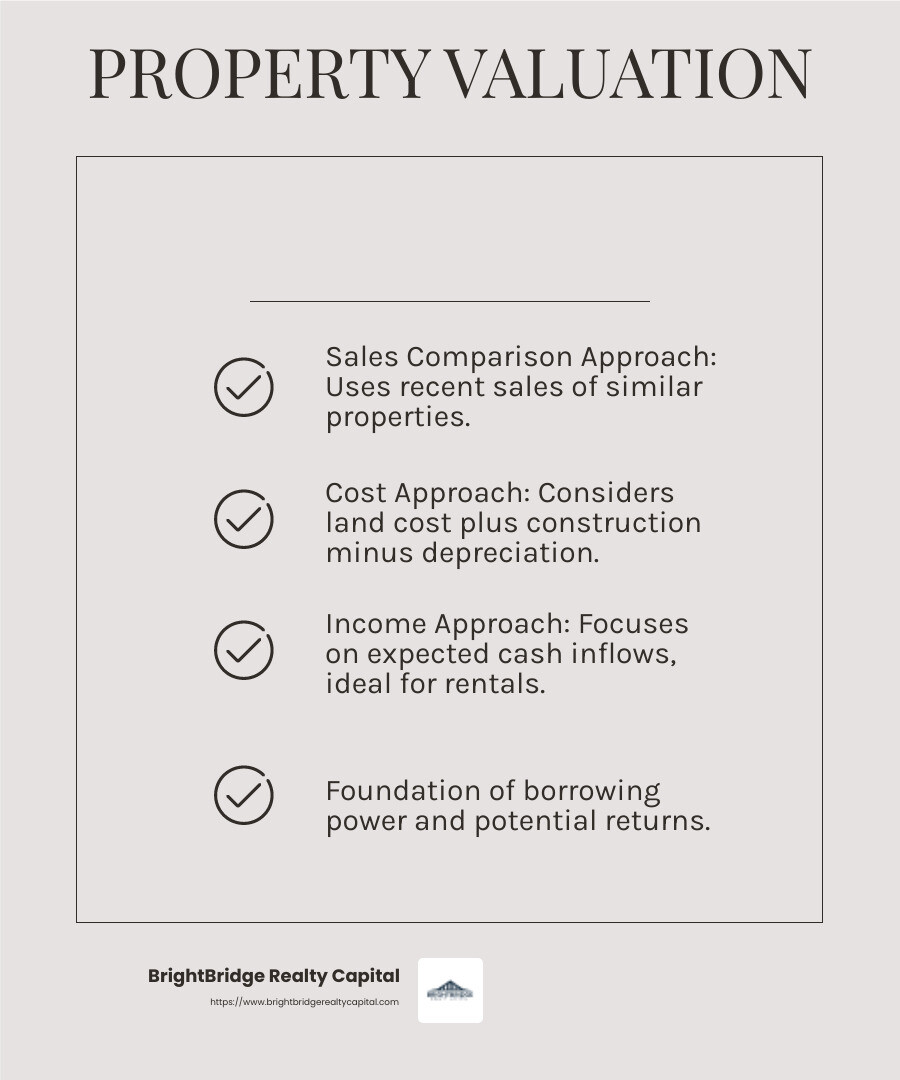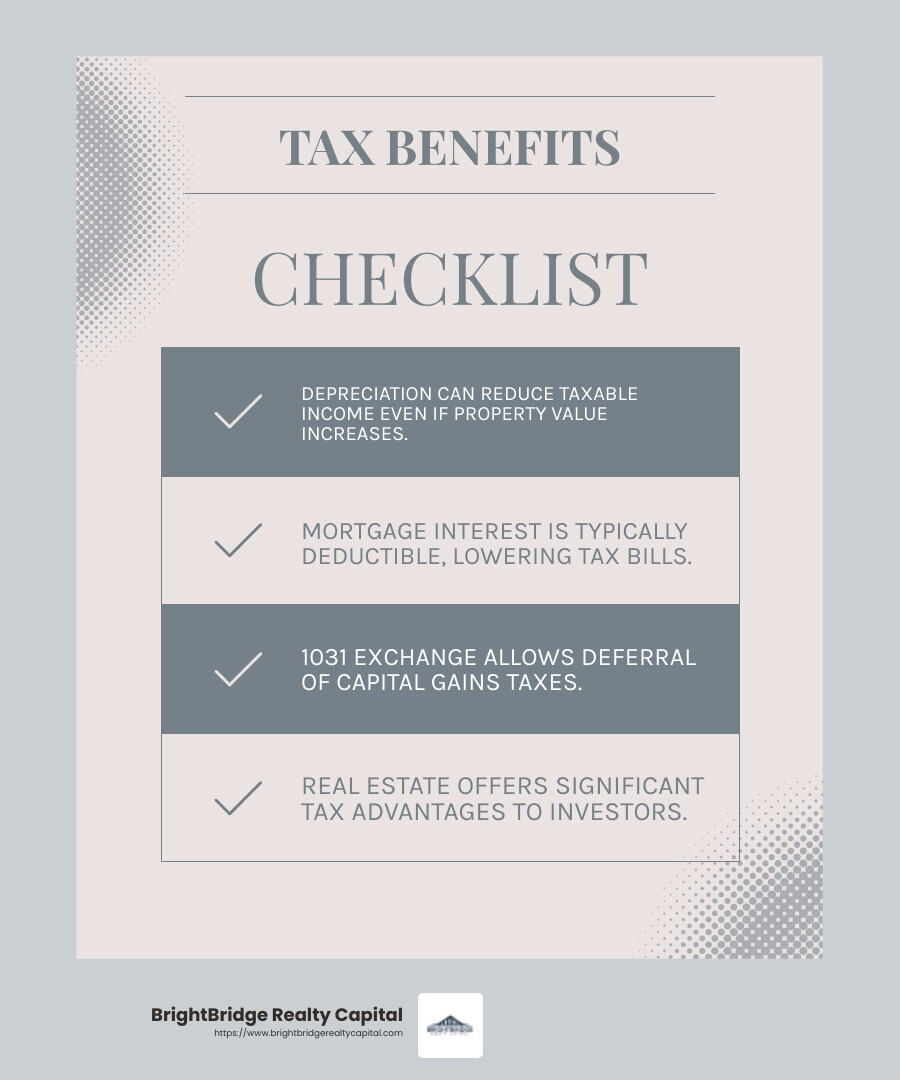Crafting Your Real Estate Investment Strategy: A Comprehensive List

Real estate investment strategies can shape your financial future, offering diverse ways to profit from property markets. Whether you're flipping houses or holding properties for rental income, it's crucial to choose the strategy that aligns with your financial goals and risk tolerance. Here's a quick look at some popular strategies:
- Long-term rental properties: Generate passive income and build equity over time.
- House flipping: Buy, renovate, and sell properties for quick profits.
- Short-term rentals: Leverage platforms like Airbnb for immediate cash flow.
- REITs and real estate funds: Invest in real estate without direct property management.
- Wholesale real estate: Contract a property and assign the contract to a third-party buyer, often with no renovation.
Investing in real estate involves substantial capital and can be a complex process. Navigating these investments requires not just money, but the right strategy, timing, and knowledge of market dynamics.
For instance, real estate markets are heavily influenced by local factors like employment rates and school quality, making location crucial. Somewhere in New York, a peaceful open space might evolve into a commercial hub, drastically shifting its real estate value.
In fluctuating market cycles and varying property values, understanding these strategies can make a difference. With the right approach, guided by insights into global trends and financial models, you can harness real estate as a robust investment vehicle.

Basic real estate investment strategies vocab:
Understanding Real Estate Investment Strategies
When diving into real estate investment strategies, it's important to understand the different approaches and how they align with your financial goals. Each strategy comes with its own risk and return profile, so let's break down the main types:
Core Investments
Core investments are the most conservative option. They focus on high-quality, well-located properties with stable, long-term tenants. These properties are usually 100% leased and require minimal management. The aim here is stability and predictable cash flows. Because of their low risk, core investments often have lower returns but are easier to sell.
Example: Think of a fully leased office building in the heart of New York City. It's a prime location with established tenants, offering steady income.
Core-Plus Investments
Core-plus investments are a step up in terms of risk and potential returns. These properties may require minor improvements or have slightly higher management needs due to shorter lease terms or minor deferred maintenance. They offer a balance between stability and growth potential.
Example: A slightly older apartment complex needing some updates to attract higher-paying tenants. With a bit of work, the property’s value and rental income can increase.
Value-Add Investments
Value-add investments require more active management and capital improvements. These properties often have high vacancy rates or need significant renovations. The goal is to increase the property's value through upgrades and operational improvements.
Example: An underperforming shopping mall that, with renovations and new marketing strategies, could attract more retailers and shoppers, boosting its value.
Rationale: If you have the expertise and resources to manage these projects, value-add investments can offer substantial appreciation.
Opportunistic Investments
Opportunistic investments are the highest risk but offer the potential for the highest returns. These can include development projects or distressed assets in high-growth areas. They require extensive expertise and are susceptible to market volatility.
Example: Investing in a rundown industrial area with plans to develop it into a trendy retail and residential district. The potential for high returns is there, but so are the risks.
Rationale: With significant market growth or updates, these investments can be very rewarding, but they require careful planning and execution.
Understanding these real estate investment strategies helps you align your investments with your risk tolerance and financial goals. Whether you're seeking stable income or aiming for significant capital appreciation, knowing your options is key.
Next, let's explore five key real estate investment strategies that can further diversify your portfolio.
5 Key Real Estate Investment Strategies
In the field of real estate investment strategies, there are a few standout approaches that can help you build a diversified portfolio. Let's take a closer look at these five key strategies.
Publicly Traded REITs
Publicly traded REITs are like the stock market's gateway to real estate. These companies own and often manage commercial properties like office buildings, shopping centers, or apartments. By investing in REITs, you can earn a share of the income produced without the hassle of direct property management.

Pros:
- Liquidity: Buy and sell on major exchanges easily.
- Diversification: Exposure to various commercial properties.
- Income: Regular dividends from the properties' revenue.
Cons:
- Market Volatility: Prices can fluctuate with the stock market.
Private Real Estate Funds
Private real estate funds pool capital from multiple investors to invest in various real estate projects. These funds often focus on value-add or opportunistic investments, aiming for higher returns.
Pros:
- Professional Management: Managed by experienced professionals.
- Potential Returns: High returns for those willing to commit long-term.
Cons:
- Limited Liquidity: Not easily sold or transferred.
- Accredited Investors Only: Generally open to those with significant financial resources.
Long-term Rental Properties
Owning long-term rental properties is a classic way to build passive income and equity over time. By renting out properties, you can generate steady cash flow while potentially appreciating in value.
Pros:
- Steady Income: Monthly rent payments.
- Equity Building: Property value may increase over time.
Cons:
- Active Management: Requires tenant management and property upkeep.
Short-term Rental Properties
Short-term rentals or vacation rentals have gained popularity thanks to platforms like Airbnb. These rentals can offer higher cash flow compared to long-term rentals, especially in tourist-heavy areas.
Pros:
- Higher Income Potential: Charge premium rates for short stays.
- Flexibility: Use the property yourself when not rented.
Cons:
- High Turnover: Frequent cleaning and management required.
House Flipping
House flipping is for those who enjoy renovation and have a keen eye for market trends. The goal is to buy undervalued properties, renovate them, and sell them at a profit.
Pros:
- Quick Returns: Potential for significant profit in a short time.
- Market Knowledge: Leverage local market trends for success.
Cons:
- High Risk: Requires deep market understanding and renovation skills.
- Capital Intensive: Ties up significant capital during the flip.

These real estate investment strategies each offer unique benefits and challenges. Whether you're interested in the steady income of rental properties or the dynamic world of house flipping, understanding these strategies will help you make informed investment decisions.
Next, we'll dig into the financing options available for your real estate ventures.
Financing Your Real Estate Investments
When diving into real estate investment strategies, understanding financing is crucial. Let's explore three key aspects: property valuation, mortgage financing, and tax benefits.
Property Valuation
Property valuation is the cornerstone of real estate investing. It determines how much you can borrow and impacts your potential returns.
Sales Comparison Approach: Compare recent sales of similar properties. This is the most common method, especially for existing homes.
Cost Approach: Consider the cost of land plus construction, minus depreciation. This is useful for new builds.
Income Approach: Calculate based on expected cash inflows, ideal for rental properties.

Mortgage Financing
Mortgage financing is the engine that powers most real estate investments. It allows you to leverage capital, increasing your purchasing power.
Interest Rates: Lower rates mean cheaper borrowing costs, boosting your investment's potential returns. However, be cautious of market overheating.
Down Payments: Investment properties often require higher down payments than primary residences. This can range from 20% to 30%.
Credit Requirements: Strong credit scores can secure better rates and terms, reducing overall costs.
Tax Benefits
Real estate investing offers several tax benefits that can improve your returns.
Depreciation: Deduct the property's cost over time, even if it appreciates. This can significantly reduce taxable income.
Interest Deductions: Mortgage interest is typically deductible, lowering your tax bill.
1031 Exchange: Defer capital gains taxes by reinvesting proceeds from a property sale into a similar property.

Understanding these financing components will help you craft a robust investment strategy. Next, we'll explore strategies custom for beginners in real estate investing.
Real Estate Investment Strategies for Beginners
Starting your journey into real estate investment strategies can seem daunting, but with the right approach, beginners can find success. Here, we'll explore some strategies that are particularly suitable for those just stepping into the real estate world.
Beginner Strategies
For new investors, it’s crucial to start with strategies that are simple and manageable. Consider these options:
House Hacking: Live in one part of a property while renting out the rest. This can help cover mortgage costs and is a great way to ease into property management.
Partnering Up: Team up with more experienced investors. This can reduce risk and provide valuable learning opportunities.
Real Estate Investment Groups (REIGs): Join a group where you can invest in properties without the hassle of direct management. This is like a mutual fund for rental properties.
No Money Down
Investing in real estate without a hefty down payment is possible, though it requires creativity and diligence.
Seller Financing: Negotiate with the seller to finance the purchase, allowing you to pay them directly over time.
Lease Options: Rent a property with the option to buy it later. This can be a stepping stone to ownership without an initial large investment.
Hard Money Loans: These are short-term loans from private lenders, suitable for quick deals but often come with higher interest rates.
Rental Property Investing
Owning rental properties can be a powerful way to build wealth and generate passive income.
Long-term Rentals: Purchase properties to rent out for extended periods. This provides a steady income stream and potential appreciation over time.
Short-term Rentals: Consider vacation rentals for higher potential returns. Platforms like Airbnb make this more accessible, though it requires active management.
Multi-family Properties: Buy a duplex or triplex, live in one unit, and rent out the others. This can help offset living costs and build equity.
By starting with these beginner-friendly strategies, you can establish a solid foundation in real estate investing. Next, we'll address some frequently asked questions about real estate investment strategies.
Frequently Asked Questions about Real Estate Investment Strategies
How to invest in real estate with no money?
Investing in real estate without a large upfront payment is challenging but possible. Here are some ways to get started:
Seller Financing: Sometimes, sellers are willing to finance the property themselves. This means you pay the seller directly in installments instead of getting a traditional mortgage.
Lease Options: Rent a property with an option to purchase it later. This allows you to "test drive" the property while saving for a down payment.
Partnering with Investors: Find a partner who has the funds but not the time or expertise. You can manage the property while they provide the capital.
Hard Money Loans: These are short-term loans from private lenders. They come with high interest but can be a quick way to secure a property.
What are the best real estate investment strategies?
The best real estate investment strategies depend on your goals, risk tolerance, and market conditions. Here are some popular ones:
Publicly Traded REITs: Invest in real estate without owning physical property. REITs offer liquidity and regular dividends.
Private Real Estate Funds: Pooled investments in real estate projects, often managed by professionals. Suitable for those seeking diversification.
Long-term Rental Properties: Provide stable, passive income and potential appreciation. Ideal for those looking to build wealth over time.
Short-term Rental Properties: Higher income potential from vacation rentals. Requires active management but can yield significant returns.
House Flipping: Buy, renovate, and quickly sell properties for profit. Demands market knowledge and project management skills.
How do mortgage rates affect real estate investments?
Mortgage rates play a crucial role in real estate investments. Here's how:
Low Rates: Lower rates make borrowing cheaper, increasing demand for properties. This can drive up property prices and make it easier to generate positive cash flow.
High Rates: Higher rates increase borrowing costs, potentially cooling the market. This can lead to lower property prices but also higher monthly payments for investors.
Fixed vs. Variable Rates: Fixed rates offer stability in payments, while variable rates can fluctuate with the market. Your choice depends on how much risk you are willing to take.
Understanding these dynamics can help you make informed decisions in your real estate investment journey. Next, let's explore how BrightBridge Realty Capital can assist you with customized financing and quick funding.
Conclusion
When it comes to real estate investment strategies, having the right financial partner can make all the difference. This is where BrightBridge Realty Capital steps in. We specialize in providing customized financial solutions custom to your unique investment needs.
Our expertise lies in quick funding. We understand that timing is crucial in real estate. That's why we offer fast closings, often within a week. This speed allows you to seize opportunities as they arise, keeping your investment strategy on track.
At BrightBridge Realty Capital, we pride ourselves on our direct lending approach. By eliminating intermediaries, we offer competitive rates and a seamless process. Whether you're flipping houses, building a rental portfolio, or starting on new construction, our flexible funding solutions are designed to support your goals.
Located in New York, we provide nationwide services to meet the diverse needs of real estate investors. Our commitment is to ensure that your investment journey is smooth and successful.
Ready to get started? Explore our loan options and see how we can help you craft the perfect real estate investment strategy.


